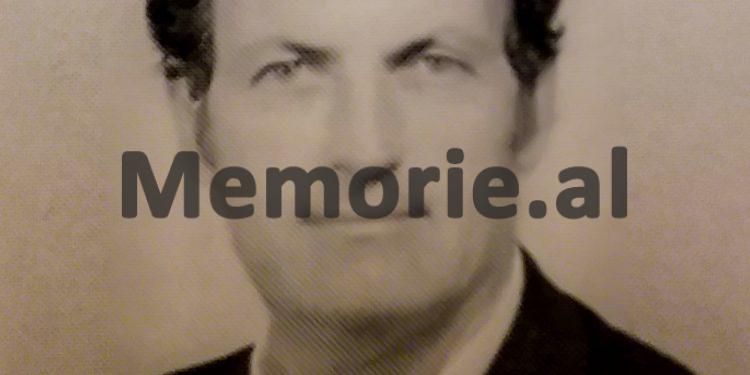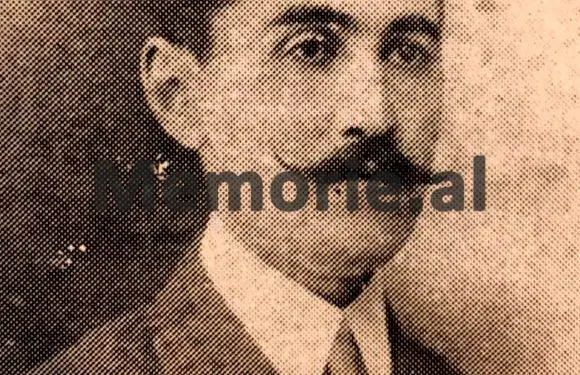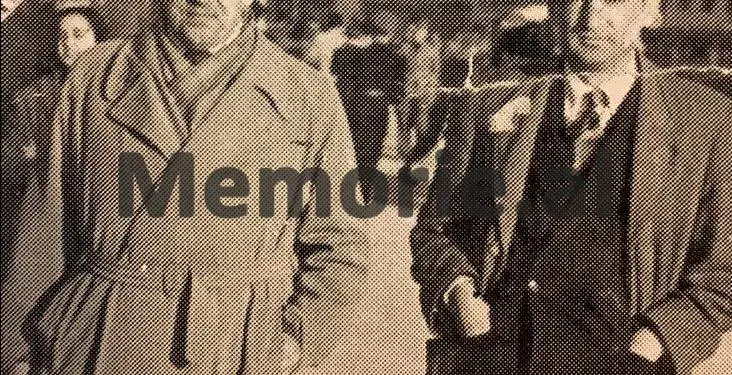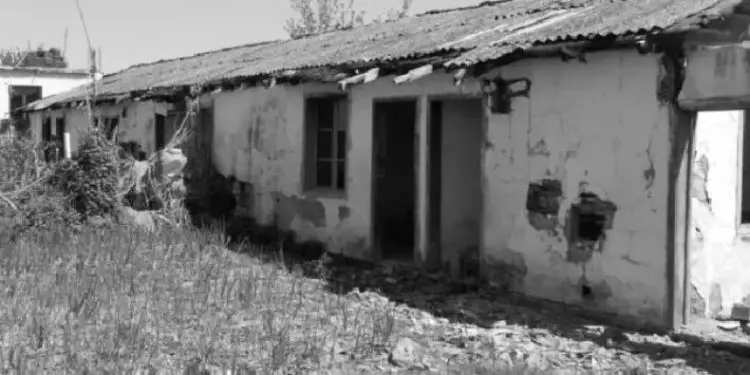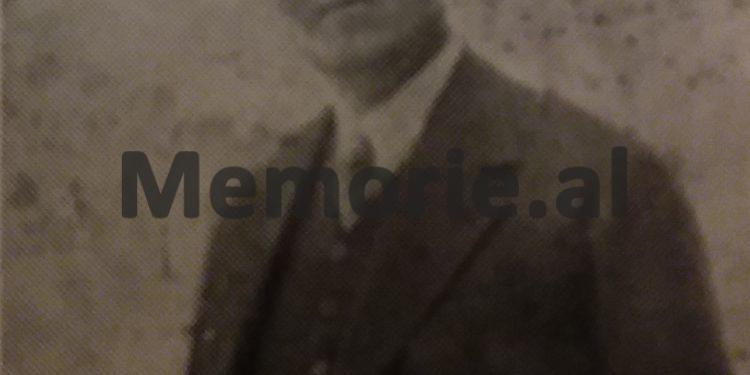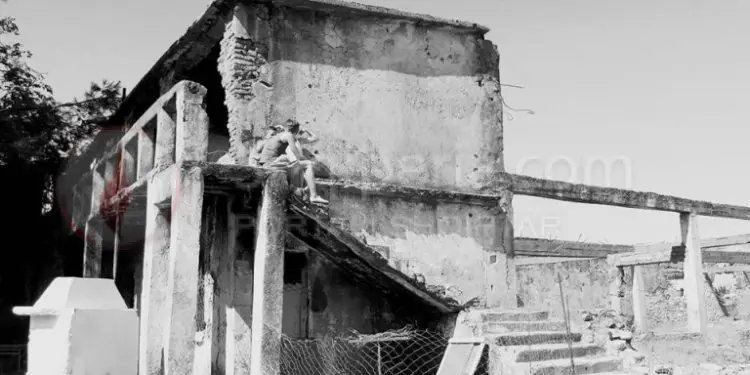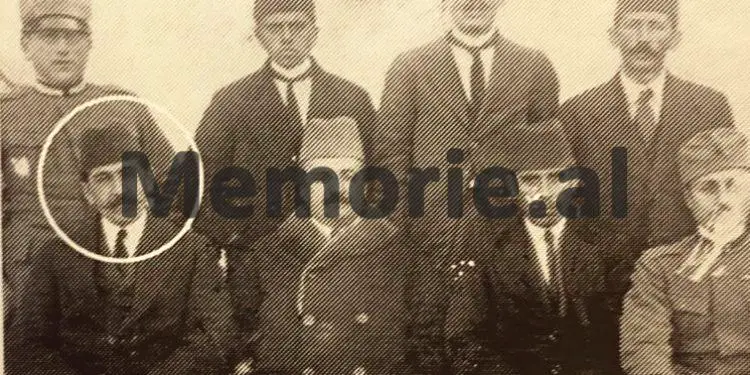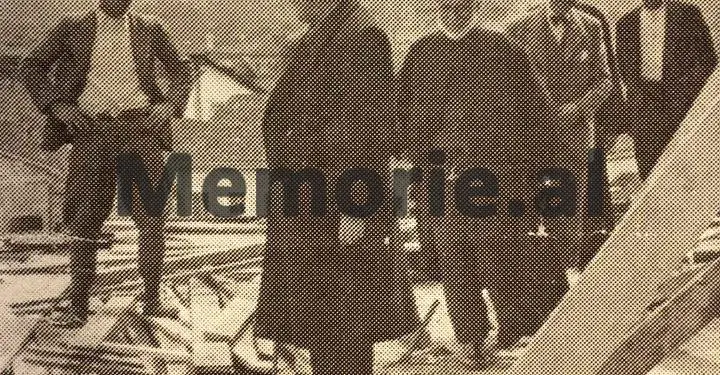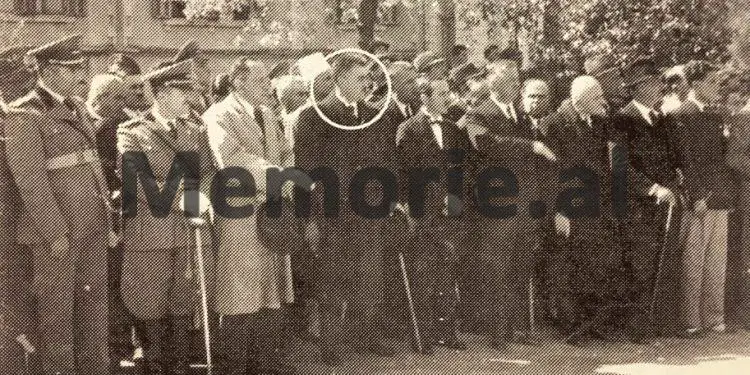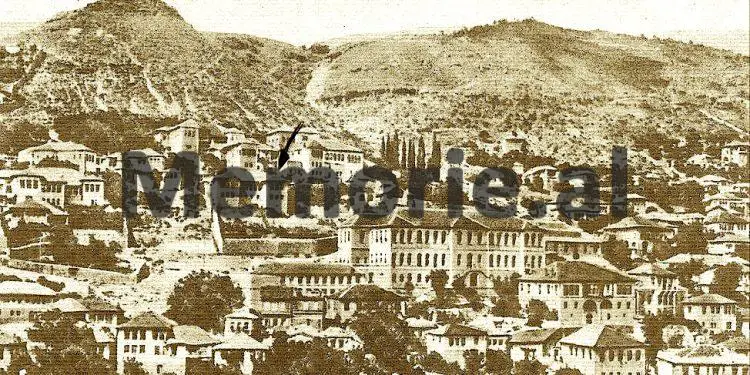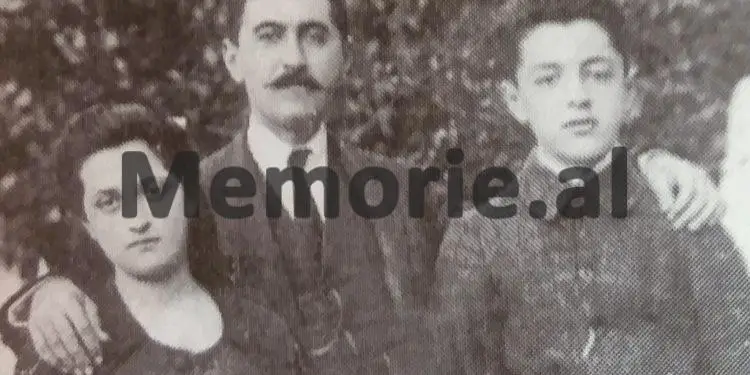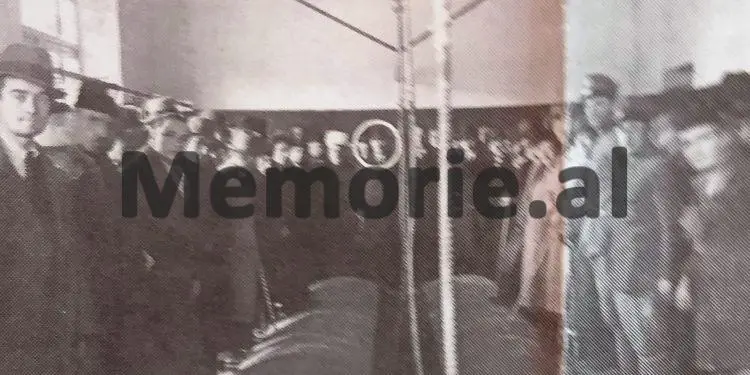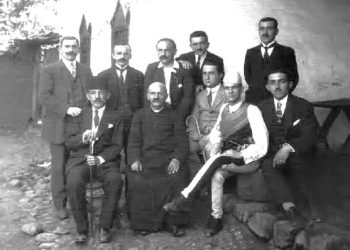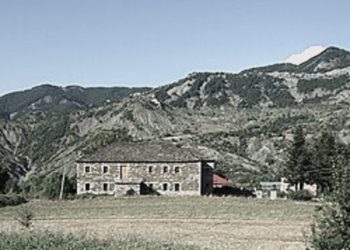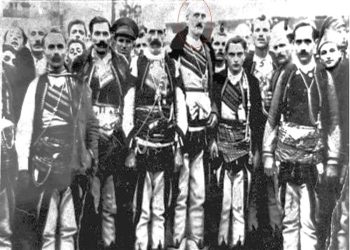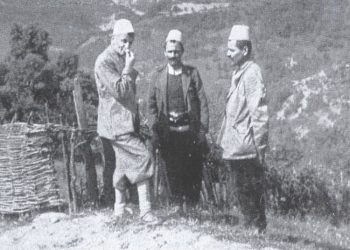Dashnor Kaloçi
Memorie.al publishes the unknown story of the much talked about event in the history of Albania that took place in March 1908, when Çerçiz Topulli, in cooperation with his committees, assassinated the Commander of the Gjirokastra Brotherhood, the Turkish Bimbashi, Halil Efendi, who was originally from Bosnia. The unknown story comes through the memoirs of Javer bej Hurshit, originally from Abkhazia, former mayor, prefect, MP, minister and senator, from the period of the declaration of Independence of Albania, until the end of the War in November 1944, (when he would be arrested and shot a few months later after being tried in the Special Court), which were inherited and preserved by his nephew, Shahin Hurshiti, in Tirana.
The Commander of the Gjirokastra Gendarmerie, Bimbashi Halil Efendiu, from the bay, wanted to dictate who were the people who sheltered Çerçiz, to deport them. Someone reported that Çerçiz’s fiancée, Qamoja, was pregnant. If this were proven, it would be a living proof that Çerçiz was held by the woman tribe. So Bimbashi decided to send a doctor to examine Qamon. This was reported to Çerçiz who, in order to stop a job that was shameful according to our custom, decided to kill Bimbashi from Gjirokastra. “By the time I reached Hani i Çiçve at the entrance to the bazaar from Hazmurat, two shots were heard one by one, and as we approached to see what had happened, we saw Bimbashi lying on the ground and dead.” .
This is what is written, among other things, about the already well-known event in the history of Albania, which is about the murder of the Turkish Bimbashi of Gjirokastra in 1908 by Çerçiz Topulli’s gang, in the memoirs of Javer Bey Hurushiti, former mayor, prefect, MP, minister and senator from the period of the declaration of Independence until the end of the War in 1944, who a few months later, in April 1945, would be executed by firing squad, after being tried by the “Special Court” of along with 63 other defendants, all former functionaries, senior officials, and well-known intellectuals from the first government of Ismail Qemali to the last one under German occupation in November 1944.
His memoirs, Javer bej Hurshiti are in manuscript and they were written by him in four thick notebooks in 1939 and they are possessed by his nephew, Shahin Hurshiti, who made them available for us to be published by Memorie.al
But who was Javer Bey Hurshit and what is his past? How was he arrested together with his son, Mehmet, in January 1945, and why did Enver Hoxha order the return of all the belongings that were confiscated from him on the day of his arrest ?! Why did Halil Hoxha beg his son Enver not to shoot Javer with the convicts of the Special Court and what was the answer he received from him? How was Javer Bey’s family treated by the communist regime, and how were his nephew’s children preserved the famous memories of the historical events he himself had experienced, which he had written since 1939?
Regarding these and other events from the history of the Hurshiti family, we know the testimony of his nephew, Shahin Hurshiti and from the memoirs of Javer Bey, we are publishing the story of the murder of the Turkish Bimbashi by Çerçiz Topulli ç’s squad, since he is a one of the most popular figures of fighters in the South of Albania.
Regarding what pushed Javer Bey Hurshtit to write his memoirs, at the beginning of the first notebook he said: “Unfortunately, very few, very few Albanians have kept notes of their memoirs. I, almost that, I have happened in all the national movements that have happened in the province of Labëria: I have not been shaken from Gjirokastra all the time of the Greek and Italian occupation: I have witnessed so many important events that as if in those times, you have recording the events day by day, today you will be able to publish the complete history of Gjirokastra from 1912 to 1925. Exactly the history of those times that are very important for the history of our National Renaissance, today I decided to write the memoirs, but these will be very flawed.I have forgotten many important dates and many names of people who have played important roles.Therefore these memoirs will serve more than serve the history of the country more family as well with ”
Continued from the previous issue
The last state function held by Javer Bey Hurshiti was that of Prefect of Shkodra, which he held from 1936 until the end of 1943, when he resigned after several conflicts with Major Hauzding, Chief of the German Gestapo. in the city of Shkodra. Those conflicts came as a result of the numerous interventions that Javeri made from the position of Prefect, for the release of the communists arrested by the German Command of that city. Although Javer Hurshiti left the state administration at the end of the autumn of 1944, he had several offers from the Germans to leave Albania, together with his family. But he refused, feeling perfectly clean and convinced that the communists who were coming to power would not only not harass him, but would know and appreciate him for the help he had given them by many of them escaped the shooting.
Arrest of Javeri and Mehmet
But what Javer Bey had thought, that the Communists would not harass him when they came to power, did not turn out as he had predicted. On the contrary, the events took place contrary to what the old politician with more than 25 years of career had thought. Regarding this, his nephew Shahin Hurshiti (Mehmet’s son) confesses: “Although at the end of 1944, I was not more than five years old, I remember very well that in our house, on Qemal Stafa Street “, It was often discussed: whether father Mehmeti, with grandfather Javer Beun, would leave Albania or not. These discussions came after they both received numerous offers from their friends who had worked together in the Supreme State Council, and the National Assembly, who were told to leave the country with their families, to escape any possible revenge. of the communists. But from what I remember and from what my father told me years later, neither he nor his grandfather, Javer Beu, had ever mentioned that they would ever leave Albania. This came as they felt quite clean and spotless, although both had held senior office since the 1920s. But it did not happen as the father and grandfather had thought. I remember as now that day in early January 1945, when around the clock four in the afternoon, in our house (in the two-storey villa on “Qemal Stafa” street where we lived for rent), two partisans knocked, who after introducing themselves treated us very cordially. According to their behavior, our family also welcomed them very well, who after entering and taking the occasional rents, said that they had orders to take with them to the Command, father Mehmet and grandfather Javer Beun. Before leaving, with the same courtesy that they came in the beginning, the partisans told us that they had no more than five minutes to work with their father and grandfather and would send them back home. While we waited all night, anxious for father and grandfather to come, the next day in front of our house came three “Renault” cars with partisans, who began to take all our furniture, telling us that they had orders for us confiscated. Along with the furniture and body clothes, in one of the cars they loaded and all the books of our very rich library and other documents that had been preserved since the time of Turkey. That day we could only save four notebooks where Grandpa, Javer Beu, had written his memoirs as well as some photos. We gave these to our aunt, Fatima, Javeri’s older sister, who married Avni Abazi, who was the nephew of Namik Bey Delvina. That same afternoon, to our surprise, the two furniture cars that took everything from us, brought them back home and unloaded them all as they had been taken in the morning. That day and some time later we could not find out the reason because they returned the furniture. We learned this later and the order for their return was given by Enver Hoxha himself, who said: “They did everything, but did not steal, they are honest”. Although after these words of Enver Hoxha, who is said to have said after the intervention of his father Haliti, whom Javer Bey had found in case of various difficulties he had had. After a few days we were removed from that house and sent to Shijak, to Katër Rrugët. We found a good and rich man there, who vacated a barracks and our whole family took refuge there “, remembers Shahin Hurshiti, at the time when they were interned in Shijak, after his grandfather Javer Bey Hurshiti was shot and father Mehmeti, was sentenced to 15 years in political prison.
Internment in Tepelena
How did things turn out with Javer Bey Hurshiti’s family and how were they treated by the communist regime? Regarding this, Shahini recalls: “In Shijak, our family was found and protected by our sister’s husband, Mit’hat Çela, who was from a well-known Kavaja family and its members had been closely associated with war. This did not last long, for Mit’hati not only could no longer defend us, but he himself was arrested in 1951 and told in court: “You have collaborated with the enemies of the class.” After Mit’hati was sentenced to 12 years in political prison, our family was removed from Shijak and some of them were brought to the NISH-Tulla Camp in Kamza, (Tirana) and my mother Firdesi and I were taken to the Tepelena Internment Camp. Only the older sister, Esmaja, escaped from exile, who married the son of Ismail Qemal Vlora. But Esmaja also suffered, because her father-in-law, Qamil Vlora, the son of Ismail Qemali, as well as her husband, the young Ismail Qemali, were sentenced to prison. There in that camp we have seen the greatest horrors, because from hunger and disease, people were dying there every day. The dead were buried on the banks of the Bënçë River, so that when the river came in the winter, it would take them away and their bones would no longer be found. I do not exaggerate at all, but in that camp we had envy and mountain goats which fed on thorns, because we internees in that camp did not even have thorns to eat. In those conditions we lived in that camp until 1954, when it was demolished, we were sent to Lushnje “, remembers Shahin Hurshiti, the terrible camp of Tepelena where at that time almost most of the suckers of the most famous families in Albania were interned. Some of them never returned to their places, because they died and were buried in the cliffs and cliffs of the Bënçë River, where the inhabitants of those parts show that until recently, its gravel was illuminated by the phosphorus of the bones of deads.
Coffins from the barracks window
But until the communist regime’s hatred of the family and descendants of Javer Bey Hurshit, the old politician who had paid 5,000 napoleons of gold to keep Gjirokastra from being burned by Greek andartis and led the Gjirokastra volunteers, in the Saranda war, where he raised the flag in 1913 ?! Regarding this, Shahini recalls: “In the city of Lushnja, our family was assigned to live in a tin hut, somewhere near the current stadium, in the neighborhood” Congress of Lushnja “. That shack was covered with tar and its floor was directly on the ground. At the time we were sent there, my father was still in prison and he sent us a letter stating that we had been permanently deprived of the right to return to Tirana. The father, Mehmeti, was released from prison in 1955, and he lived there in that cramped barracks until his death on February 21, 1980. On the day of the funeral, we pulled our father’s coffin out of the barracks window. as we had done two years ago and with the mother, as the door of the barracks was too narrow and did not push their coffins. Our family was able to survive in that plywood shack, on the outskirts of Lushnja, thanks to the great help given to us by the wonderful inhabitants of that wise city, who were available to us for everything “, concludes his tragic story, Shahin Hurshiti , who, along with their brothers and sisters, suffered in internment camps, for the sole reason that they were the descendants of Javer Bey Hurshit, a well-known former politician from the period of the Declaration of Independence, who was shot by the Special Court in April 1945, accused of being “enemy of the people”.
Who was Mehmet Hurshiti?
Mehmet Hurshiti was born in the stone city of Gjirokastra in 1906 and was the first child of Javer Bey Hurshiti, who later had two daughters, Fatimeja in 1910 and Aferdita in 1921. Mehmeti, after finishing primary school in Gjirokastra, was sent to attend the French Lyceum in the city of Korça, which he completed in 1927. In 1925, when Mehmet Hurshiti was still teaching at the French Lyceum in Korça, he married in Gjirokastra, a girl who was granddaughter of Myftar Bey Sevrani, originally from Skrapar, who was educated at the Istanbul Military Academy and served as Bimbash (Chief – Police) in Gjirokastra, Korca and Leskovik. After graduating from the French Lyceum, Mehmeti returned to his hometown of Gjirokastra and worked for some time as Secretary of the Municipality. That same year he resigned after his family moved to Tirana, after his father Javeri was elected as a member of the Albanian Parliament. After coming to Tirana, the same year, Mehmeti gained the right to study to pursue higher studies in Italy in the field of Political Science. Around 1934 – ‘35, Mehmet Hurshiti stopped his studies for reasons that are not known and have remained unclear by members of his family, and after that he returned to Albania. In September 1936, Mehmeti was subjected to a competition held by the then Prime Minister of the Prefecture of Durrës, together with the Prefect Rexhep Jella (who was educated in London) and then transferred to the Prefecture of Tirana, where he worked as deputy prefect until the beginning of 1944 together with Prefect Qazim Bey Mulleti. From the marriage with Firdes, Mehmet Hurshiti had eight children. The first was Esmaja, (who married the grandson of Ismail Qemal Vlora, Ismail Qemali the young), Dakmareti, Ishhani (Shano), Meribani, Tomorri, Rustemi, Geraldina (was born on the day that King Zog was married, who named after his wife, Queen Geraldina) and the last of the children, was Shahini who was born in 1940 in Tirana./Memorie.al




